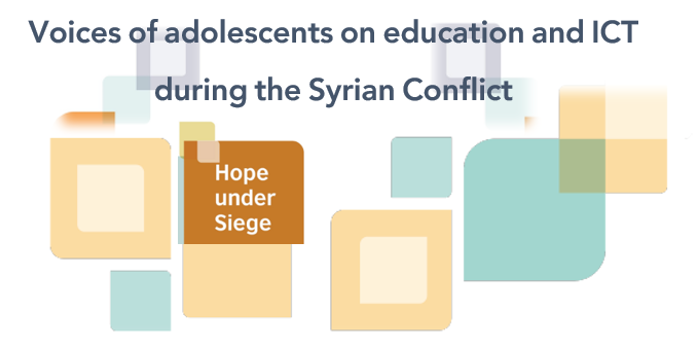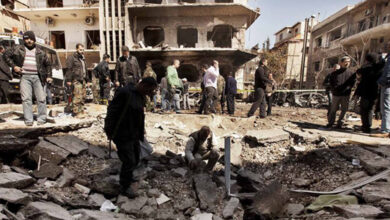The “Hope under Siege” research aims at assessing each of the challenges that adolescents in Syria encounter in relation to education and ICT. The research assessed the realisation of adolescent girls’ and boys’ rights, and analysed key aspects of gender-based inequalities and abuses. It used qualitative methods to assess the immediate, underlying and structural causes of any lack and/or violations of girls’ and boys’ rights in the armed conflict context.
The research has developed a blended mixed- methods research methodology that is innovative, participatory, and gender-sensitive within the context of ongoing conflict in Syria. The research adopted in-depth consultations with adolescents using age-appropriate innovative interactive methods, allowing them to express themselves and their perspectives through collective activities like discussions, writing, drawing etc. The activities were designed to understand and analyse key challenges, needs, threats, and rights violations. Causes and factors that are affecting adolescents as well as key advantages and aspirations, options and intervention areas. The research also included semi-structured interviews and focus group discussions with key informants, parents and caregivers in the study areas.
The participatory approach was achieved by recruiting researchers, facilitators and note takers from the local studied communities and selecting diverse and wide samples of female and male adolescents and adults to participate. After the random selection of the final sample, the consultations were conducted with 642 girls and boys aged (13-18) years old from 11 different areas in Syria (Idleb, Aleppo, Al-Bab, Homs, Tartous, Damascus, East Ghouta, Al-Tall, Al-Sweida, Raqqa). The sample of adolescents included participants from rural and urban areas, in and out of schools, internally displaced (IDPs) and host communities, orphaned, disabled, working and/or married.
The research team prioritised assuring that the research design and implementation were in line with high standards for research ethics. And Special attention was given to the sensitivities of conducting research in a conflict context, with adolescents and children, with girls and boys, and under COVID-19 circumstances. It ensured respecting the privacy and the effective participation of adolescents and their communities in developing the research and engaging with the dialogue about the results.
Adolescents, caregivers and key informants told of severe losses of the education system during the conflict. First, fragmented education systems have emerged over the last decade, categorised by distorted and politicised governance, lack of qualified teachers, different curricula, and poor quality. Second, infrastructure and equipment have been subject to severe destruction or used for other purposes such as shelters for IDPs. Third, siege and discrimination policies further restricted the access of children and adolescents to school. Fourth, COVID-19 increased the challenges for education including the closure of schools, health fears and a lack of precautionary measures. Finally, insecurity and an increase in household poverty contributed to an increase in school dropout rates. Furthermore, the deterioration of public education services led to an expansion of the role of civil society and the private sector in education, although this was a humble contribution compared to the substantial education loss.
The adolescents were aware of the importance of digital learning, especially in the conflict context. However, most of them expressed a lack of access to learning through the internet due to a lack of Arabic content and platforms, poor access to the internet and electricity, costly internet and equipment. Also, labs in schools are not equipped or used to develop their skills in digital learning. Adolescents debated the pros and cons of ICT. They appreciated access to information, knowledge, learning sources, communicating with family friends and people from different cultures, developing their life and social skills, and finding jobs and generating income. But many of them highlighted cons such as wasting time, bullying, hacking, loss of privacy, exposure to bad content including violence and pornography, addiction, isolation, and misleading information.
The research concludes with examples of alternative policies and programmes based on the priorities of adolescents. These alternatives address the underlying and intermediate causes of conflict, deprivation and inequality, to avoid reproducing the same challenges and grievances. The alternative policies include: Promoting adolescents as active actors in the design and implementation of policies and interventions that target young people’s learning; developing learning interventions to counter polarisation within and between Syrian communities; and upgrading the education and development nexus. Finally, the research assesses the relevance and importance of the EDGE programme for adolescents, especially girls, in the Syrian context. The research annex includes a detailed analysis for each studied area, to be used in future tailored interventions.
Download English Report:
Hope Under Siege – EnglishDownload Arabic Report:
Hope Under Siege – Arabic






